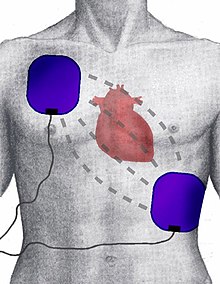 Doctors are implanting high-tech heart devices in thousands of people who probably do not need them, a new study finds. The procedures cost more than $35,000, involve surgery and anesthesia, and may unnecessarily harm some patients.
Doctors are implanting high-tech heart devices in thousands of people who probably do not need them, a new study finds. The procedures cost more than $35,000, involve surgery and anesthesia, and may unnecessarily harm some patients.
The devices, called defibrillators, fire an electrical shock to jolt the heart back into a normal rhythm if it starts to beat in a disordered way that can cause sudden death. In people who truly need them, for conditions that can fatally disrupt heart rhythm, defibrillators can be life-saving.
Study Says Thousands Get Unneeded Heart Devices
Stem cells clue to beating baldness
 Activating dormant stem cells in the scalp could be the key to banishing baldness, scientists believe. Researchers made the discovery after examining tissue sample from men undergoing hair transplants.
Activating dormant stem cells in the scalp could be the key to banishing baldness, scientists believe. Researchers made the discovery after examining tissue sample from men undergoing hair transplants.
Comparing follicles from bald and hairy scalp patches, they found that both contained the same number of stem cells.But more mature cells called progenitor cells were lacking in the bald areas.Stem cells in the scalp normally develop into progenitor cells, which in turn give rise to new hair growth.
PTSD Linked To Long Term Physical, Emotional And Cognitive Symptoms
 American soldiers with combat-related PTSD (post-traumatic stress disorder) seem to have a significantly higher risk of having diminished concentration, poor memory, headaches, tinnitus and irritability, researchers from Minnesota reveal in an article published in Archives of General Psychiatry. They also found no link between concussion or mild traumatic brain injuries and long-term consequences.
American soldiers with combat-related PTSD (post-traumatic stress disorder) seem to have a significantly higher risk of having diminished concentration, poor memory, headaches, tinnitus and irritability, researchers from Minnesota reveal in an article published in Archives of General Psychiatry. They also found no link between concussion or mild traumatic brain injuries and long-term consequences.The authors wrote: "Nearly 2 million troops have been deployed to Operation Enduring Freedom and Operation Iraqi Freedom since 2001. High levels of combat exposure have been documented among Operation Enduring Freedom/Operation Iraqi Freedom-deployed soldiers, with increased risk of blast exposure and injury and development of post-deployment mental and physical health problems."
Human embryonic stem cells may help older people battle blindness
 A therapy derived from human embryonic stem cells may help millions of Americans battle a common form of blindness.
A therapy derived from human embryonic stem cells may help millions of Americans battle a common form of blindness.
Advanced Cell Technology Inc. said Monday that it has received a green light from the U.S. Food and Drug Administration to begin a clinical trial to test its therapeutic cells as a treatment for dry age-related macular degeneration. The company plans to enroll a dozen patients in a Phase I/II trial, which would primarily test the safety of the cells and whether they are well-tolerated by patients.
Blood test to spot cancer gets big boost from J&J
 A blood test so sensitive that it can spot a single cancer cell lurking among a billion healthy ones is moving one step closer to being available at your doctor's office.
A blood test so sensitive that it can spot a single cancer cell lurking among a billion healthy ones is moving one step closer to being available at your doctor's office.
Boston scientists who invented the test and health care giant Johnson & Johnson will announce Monday that they are joining forces to bring it to market. Four big cancer centers also will start studies using the experimental test this year.
Phoenix sets zoning for medical pot sites

Phoenix planning director Debra Stark said the city aimed to make zoning laws strict enough to protect the community while allowing marijuana in the city.
A Third of 9-Month-Olds Already Obese or Overweight

The study is one of the first to measure weight in the same group of very young children over time, said lead researcher Brian Moss, a sociologist at Wayne State University in Detroit. The results showed that starting out heavy puts kids on a trajectory to stay that way.
More Articles...
Page 124 of 233

 Health Glance
Health Glance






























